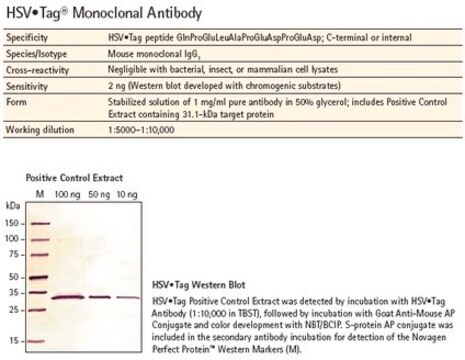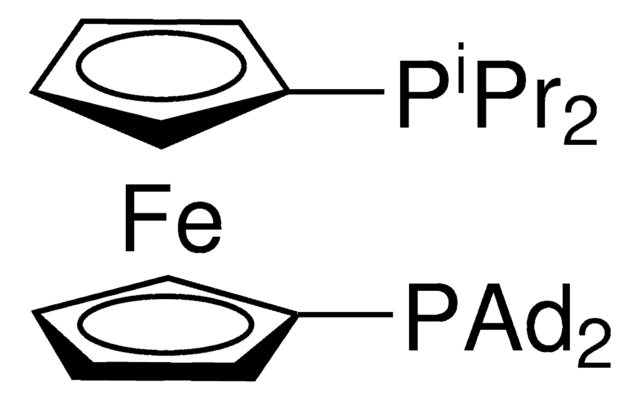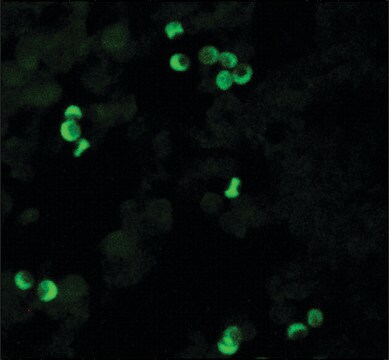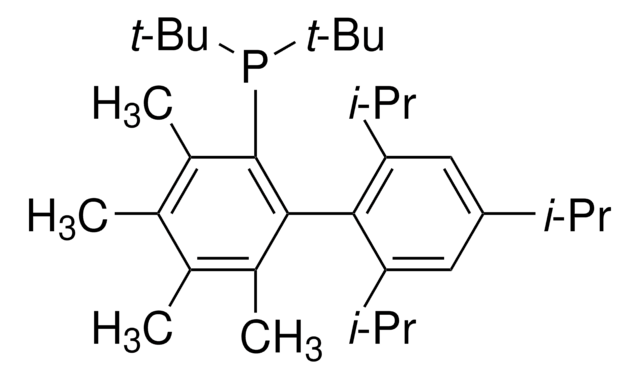AC111S
Sheep Anti-Mouse IgG Antibody, Species absorbed, Cy5 Conjugate
from sheep, CY5 conjugate
Zaloguj sięWyświetlanie cen organizacyjnych i kontraktowych
About This Item
Kod UNSPSC:
12352203
eCl@ss:
32160702
NACRES:
NA.46
Polecane produkty
pochodzenie biologiczne
sheep
Poziom jakości
białko sprzężone
CY5 conjugate
forma przeciwciała
purified antibody
rodzaj przeciwciała
secondary antibodies
klon
polyclonal
reaktywność gatunkowa
mouse
metody
immunocytochemistry: suitable
Warunki transportu
wet ice
docelowa modyfikacja potranslacyjna
unmodified
Powiązane kategorie
Opis ogólny
Immunoglobulin G (IgG) is part of the family of glycoprotein immunoglobulins which stage immune responses against pathogenic organisms. IgG contributes to the immune response by mobilizing innate immune effector cells and inducing and pro-inflammatory responses. Such proinflammatory responses are mediated by Fcg receptors which interact with sialylated Fc fragments on IgG molecules.
Specyficzność
Based on ELISA analysis using the unconjugated antibody (Cat. No. AC111), this antibody reacts with whole molecule mouse IgG (IgG>>IgG2a>IgG>>>>IgG1) with minimal or no cross-reactivity toward mouse IgA or IgM.
This antibody has been species absorbed and tested by ELISA prior to conjugation to ensure minimal cross-reactivity toward chicken IgY or IgG from human, rat, rabbit, guinea pig, and hamster species, but may cross-react with immunoglobulins from other species.
Immunogen
Purified mouse IgG.
Zastosowanie
Research Category
Secondary & Control Antibodies
Secondary & Control Antibodies
Research Sub Category
Fragment Specific Secondary Antibodies
Fragment Specific Secondary Antibodies
Sheep Anti-Mouse IgG Antibody, Species absorbed, Cy5 Conjugate is an antibody against Sheep Mouse IgG for use in Immunocytochemistry.
Jakość
Evaluated by Immunocytochemistry in A431 cells.
Immunocytochemistry Analysis: Performance of this Cy5-conjugated secondary antibody has been validated by indirect immunofluorescent labelling (1:250 dilution) of A431 cells following a mouse monoclonal anti-H3K27me3 primary antibody (Cat. No. 05-1951).
Immunocytochemistry Analysis: Performance of this Cy5-conjugated secondary antibody has been validated by indirect immunofluorescent labelling (1:250 dilution) of A431 cells following a mouse monoclonal anti-H3K27me3 primary antibody (Cat. No. 05-1951).
Opis wartości docelowych
~150 kDa observed.
Postać fizyczna
Fractionated by octanoic acid and ammonium sulfate cut, and then depleted with rat IgG column and mouse IgA column prior to Cy3 conjugation.
Purified sheep polyclonal antibody in PBS with 15 mg/mL BSA and 0.1 % sodium azide.
Przechowywanie i stabilność
Stable for 1 year at 2-8°C from date of receipt.
Inne uwagi
Concentration: Please refer to lot specific datasheet.
Oświadczenie o zrzeczeniu się odpowiedzialności
Unless otherwise stated in our catalog or other company documentation accompanying the product(s), our products are intended for research use only and are not to be used for any other purpose, which includes but is not limited to, unauthorized commercial uses, in vitro diagnostic uses, ex vivo or in vivo therapeutic uses or any type of consumption or application to humans or animals.
This page may contain text that has been machine translated.
Nie możesz znaleźć właściwego produktu?
Wypróbuj nasz Narzędzie selektora produktów.
Kod klasy składowania
12 - Non Combustible Liquids
Klasa zagrożenia wodnego (WGK)
WGK 2
Temperatura zapłonu (°F)
Not applicable
Temperatura zapłonu (°C)
Not applicable
Certyfikaty analizy (CoA)
Poszukaj Certyfikaty analizy (CoA), wpisując numer partii/serii produktów. Numery serii i partii można znaleźć na etykiecie produktu po słowach „seria” lub „partia”.
Masz już ten produkt?
Dokumenty związane z niedawno zakupionymi produktami zostały zamieszczone w Bibliotece dokumentów.
Ryan Timothy D Yu et al.
Scientific reports, 10(1), 11028-11028 (2020-07-06)
Recent data show a global increase in colorectal cancer (CRC) cases among younger demographics, which portends poorer prognosis. The cause of rising incidence is uncertain, and its mutational landscape remains largely unexplored, including those in genes of the epidermal growth
Nasz zespół naukowców ma doświadczenie we wszystkich obszarach badań, w tym w naukach przyrodniczych, materiałoznawstwie, syntezie chemicznej, chromatografii, analityce i wielu innych dziedzinach.
Skontaktuj się z zespołem ds. pomocy technicznej








